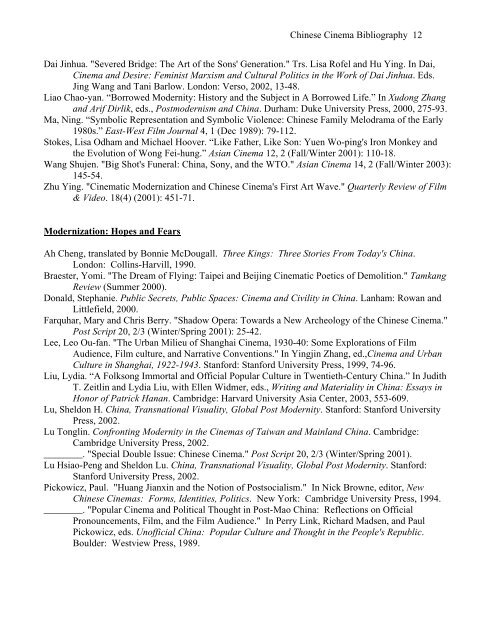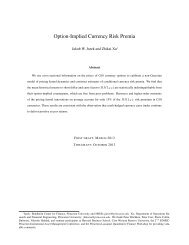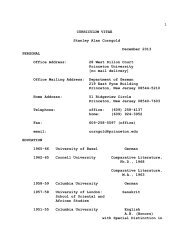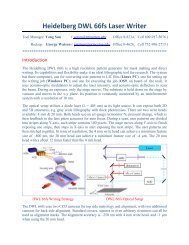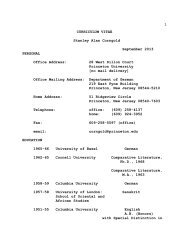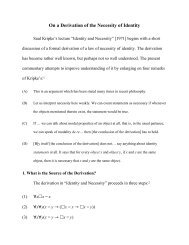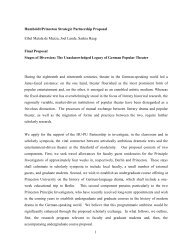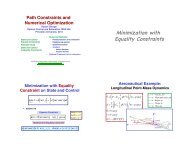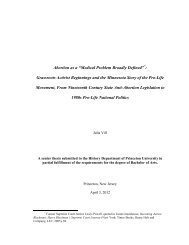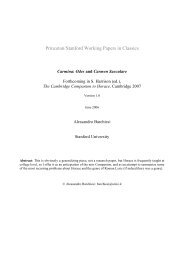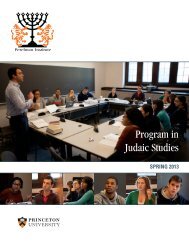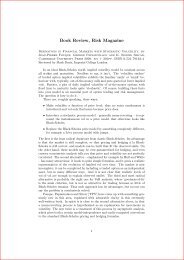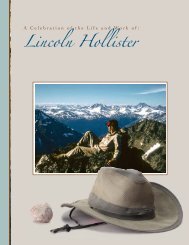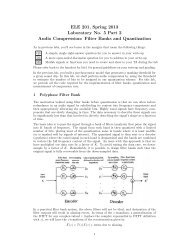A Selected Bibliography of Chinese Cinema - Princeton University
A Selected Bibliography of Chinese Cinema - Princeton University
A Selected Bibliography of Chinese Cinema - Princeton University
Create successful ePaper yourself
Turn your PDF publications into a flip-book with our unique Google optimized e-Paper software.
<strong>Chinese</strong> <strong>Cinema</strong> <strong>Bibliography</strong> 12<br />
Dai Jinhua. "Severed Bridge: The Art <strong>of</strong> the Sons' Generation." Trs. Lisa R<strong>of</strong>el and Hu Ying. In Dai,<br />
<strong>Cinema</strong> and Desire: Feminist Marxism and Cultural Politics in the Work <strong>of</strong> Dai Jinhua. Eds.<br />
Jing Wang and Tani Barlow. London: Verso, 2002, 13-48.<br />
Liao Chao-yan. “Borrowed Modernity: History and the Subject in A Borrowed Life.” In Xudong Zhang<br />
and Arif Dirlik, eds., Postmodernism and China. Durham: Duke <strong>University</strong> Press, 2000, 275-93.<br />
Ma, Ning. “Symbolic Representation and Symbolic Violence: <strong>Chinese</strong> Family Melodrama <strong>of</strong> the Early<br />
1980s.” East-West Film Journal 4, 1 (Dec 1989): 79-112.<br />
Stokes, Lisa Odham and Michael Hoover. “Like Father, Like Son: Yuen Wo-ping's Iron Monkey and<br />
the Evolution <strong>of</strong> Wong Fei-hung.” Asian <strong>Cinema</strong> 12, 2 (Fall/Winter 2001): 110-18.<br />
Wang Shujen. "Big Shot's Funeral: China, Sony, and the WTO." Asian <strong>Cinema</strong> 14, 2 (Fall/Winter 2003):<br />
145-54.<br />
Zhu Ying. "<strong>Cinema</strong>tic Modernization and <strong>Chinese</strong> <strong>Cinema</strong>'s First Art Wave." Quarterly Review <strong>of</strong> Film<br />
& Video. 18(4) (2001): 451-71.<br />
Modernization: Hopes and Fears<br />
Ah Cheng, translated by Bonnie McDougall. Three Kings: Three Stories From Today's China.<br />
London: Collins-Harvill, 1990.<br />
Braester, Yomi. "The Dream <strong>of</strong> Flying: Taipei and Beijing <strong>Cinema</strong>tic Poetics <strong>of</strong> Demolition." Tamkang<br />
Review (Summer 2000).<br />
Donald, Stephanie. Public Secrets, Public Spaces: <strong>Cinema</strong> and Civility in China. Lanham: Rowan and<br />
Littlefield, 2000.<br />
Farquhar, Mary and Chris Berry. "Shadow Opera: Towards a New Archeology <strong>of</strong> the <strong>Chinese</strong> <strong>Cinema</strong>."<br />
Post Script 20, 2/3 (Winter/Spring 2001): 25-42.<br />
Lee, Leo Ou-fan. "The Urban Milieu <strong>of</strong> Shanghai <strong>Cinema</strong>, 1930-40: Some Explorations <strong>of</strong> Film<br />
Audience, Film culture, and Narrative Conventions." In Yingjin Zhang, ed.,<strong>Cinema</strong> and Urban<br />
Culture in Shanghai, 1922-1943. Stanford: Stanford <strong>University</strong> Press, 1999, 74-96.<br />
Liu, Lydia. “A Folksong Immortal and Official Popular Culture in Twentieth-Century China.” In Judith<br />
T. Zeitlin and Lydia Liu, with Ellen Widmer, eds., Writing and Materiality in China: Essays in<br />
Honor <strong>of</strong> Patrick Hanan. Cambridge: Harvard <strong>University</strong> Asia Center, 2003, 553-609.<br />
Lu, Sheldon H. China, Transnational Visuality, Global Post Modernity. Stanford: Stanford <strong>University</strong><br />
Press, 2002.<br />
Lu Tonglin. Confronting Modernity in the <strong>Cinema</strong>s <strong>of</strong> Taiwan and Mainland China. Cambridge:<br />
Cambridge <strong>University</strong> Press, 2002.<br />
________. "Special Double Issue: <strong>Chinese</strong> <strong>Cinema</strong>." Post Script 20, 2/3 (Winter/Spring 2001).<br />
Lu Hsiao-Peng and Sheldon Lu. China, Transnational Visuality, Global Post Modernity. Stanford:<br />
Stanford <strong>University</strong> Press, 2002.<br />
Pickowicz, Paul. "Huang Jianxin and the Notion <strong>of</strong> Postsocialism." In Nick Browne, editor, New<br />
<strong>Chinese</strong> <strong>Cinema</strong>s: Forms, Identities, Politics. New York: Cambridge <strong>University</strong> Press, 1994.<br />
________. "Popular <strong>Cinema</strong> and Political Thought in Post-Mao China: Reflections on Official<br />
Pronouncements, Film, and the Film Audience." In Perry Link, Richard Madsen, and Paul<br />
Pickowicz, eds. Un<strong>of</strong>ficial China: Popular Culture and Thought in the People's Republic.<br />
Boulder: Westview Press, 1989.


